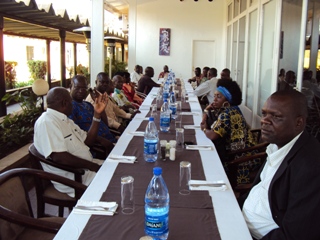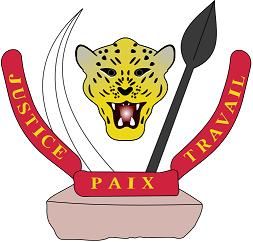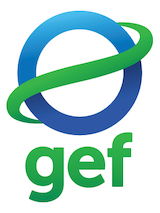Building Capacity for Climate-Resilient Food Production in DRC
Project Overview
This project, 'Building Capacity in DRC to Respond to Threats Posed by Climate Change on Food Production and Security', sought to respond to climate-change induced increased variability in agro-climatic conditions and the impacts on the agriculture sector in the DRC.
The agriculture sector forms the basis of livelihood opportunities for the majority of the population. Although increased rainfall is expected in most parts of the country, model predictions of rainfall distribution (temporal) is uncertain. There is however a high likelihood of the potential for longer intra-seasonal drought.
The project sought to reduce vulnerability among rural populations in four selected sites by promoting: the renewal of agro-genetic material through provision of germplasm more suited for expected climate conditions, as well as the creation or strengthening of the agricultural chain of support (extension services, technological tools, agro-meteorological information and planning) from local to provincial and national levels.
Building on existing rehabilitation and reconstruction efforts, including efforts to promote decentralization and to reform the public sector, the project facilitated the demonstration of adaptation measures relevant to planning at all levels, taking into account regional specificities.
Project Details
Building on the ongoing reforms and rehabilitation efforts, this project will seek to enhance the resilience of the agriculture sector by providing the tools, information, inputs and capacities to the main actors of agricultural development to enable them to adequately understand, analyse and react to climate risks. The project will demonstrate appropriate adaptation responses so as to test and pilot their feasibility and replicability. Adaptation responses will tackle agricultural production, as well as economic diversification and institutional capacity development as an integrated package of interventions designed to remove major barriers and reduce underlying causes of vulnerability. Similar adaptation options will be tested in all of the four areas, except where predicted climate conditions warrant different choices, for example: groundwater extraction potential will be tested only in Kipopo area, which is foreseen to experience more droughts and an overall decrease in rainfall, whereas rainwater harvesting and rainwater conservation will be promoted in the other three regions.
Similarly, adapted varieties disseminated in each of the region will be tested for resilience to current and anticipated climate conditions specific to each region (to adapt to sunshine, heat, precipitation and soil moisture). The project will support the deployment of a supply chain for adapted agricultural genetic material focused on three staple crops (maize, rice and cassava) based on research conducted by the National Agricultural Research Service (INERA). Adapted genetic material will be transferred to designated agri-multipliers, who will produce and multiply seeds and cuttings for distribution among households. This production and dissemination of adapted material will be supported by training and capacity building in sustainable and adapted agricultural management techniques (e.g. agroforestry, sustainable land and water management, agro-ecology) provided through the national agricultural extension services (SNV), along with the provision of enhanced and timely agro-meteorological information (including early warning bulletins, using rural radio and local associations and leaders). “No-regrets” land and water management practices will be promoted, in anticipation for changes in the precipitation regimes (droughts or floods). For example, rainwater harvesting and conservation, combined with improved irrigation during dry spells will be promoted, along with agricultural techniques designed to maintain soil fertility.
In parallel, participatory research will be conducted in order to explore the potential for local agricultural diversification (crop and non-crop, e.g. non-timber forest products, aquaculture and livestock), as a means to provide stability and a more resilient food basket to the local communities.The creation of early warning systems at decentralized level will be tested in each of the four sites, and will be implemented through the creation of interdisciplinary working groups bringing together key rural development stakeholders and institutions and technical services, who will develop appropriate methodologies for declaring and disseminating early warnings to households and communities.
In order to support the implementation of these adaptation measures, and to provide adequate and continuous support to vulnerable communities, the project will aim to strengthen institutional capacity at national and decentralized levels, namely through the upgrading of skills and strengthening or rehabilitation of infrastructure. Support will be provided to national and provincial agricultural institutions (INERA, SENASEM, SNV and Ministry of Agriculture) to better understand and integrate climate change impacts into their ongoing planning and into the delivery of community support services. It is expected that the demonstration of successful adaptation alternatives at local level will help leverage agricultural policy changes. Activities at the national, provincial and local level will be implemented so as to be mutually reinforcing:
- At the local level: The ultimate beneficiaries of the project are local agricultural households residing in villages surrounding each selected site. In addition to receiving agricultural inputs such as resilient varieties, communities will be mobilized, and their associations and groups will be strengthened through the transfer of appropriate agricultural technologies and know-how. In order to further reduce vulnerability and to address non-climate change related vulnerabilities, efforts will be made to promote diversified sources of livelihoods (non-agricultural) as well as diversified sources of food (beyond the three vulnerable staple crops).
- At the provincial level: Project sites have been selected so as to represent provincial realities, and benefit from the presence of government institutions, decentralized technical services, as well as proximity to provincial capitals and authorities. Decentralized technical services will benefit from targeted capacity building efforts so as to update skills and upgrade operational means, in order to enable them to deliver appropriate services in support of local communities. In addition, provincial sectoral planners will also be supported in the development of resilient agricultural plans, through interventions directed towards the Regional Rural Agricultural Councils, and the national extension services. Provincial level institutions will serve as the key relays of information regarding the development of early warnings.
- At the national level: Overall coordination of the project will take place at the national level in order to ensure replicability of the project outcomes. In addition, national-level ministries will be called upon to contribute to the project through their decentralized antennas, as well as benefit from capacity development towards a better integration of climate change issues into sectoral plans of relevance to this project.
In summary, the project will function as a means to place first emphasis on the delivery of improved services to local communities in order to reduce their vulnerability to climate change, as well as to address some of the underlying causes of vulnerability. Project sites have been selected to be situated in proximity of a research station, which will enable the production, multiplication and dissemination of enhanced agricultural genetic material. Project sites also benefit from ongoing extension services (provided through provincial authorities and delegations), on which this project will build. Lessons learned from local on-the-ground interventions, including pilot demonstrations of early warning systems, will be transferred to provincial planners for replication and upscaling, so as to inform provincial agricultural planning and decision-making. These together are expected to generate a leverage effect on national agricultural policy-making, with the assistance of specific tools provided to national planners through this project.
Source: UNDP DRC Project Document (November 16, 2009)
Key Results and Outputs
- Outcome 1: Climate resilience of crop systems used by rural populations is improved
- Output 1.1: An operational supply chain for the production and diffusion of climate-tolerant varieties of maize, cassava and rice
- Output 1.2: Adoption by farmers of adapted and sustainable farming techniques
- Output 1.3: Adoption of diversified climate-resilient livelihood activities.
- Output 1.4: Updated crop calendars and technological packets
- Outcome 2: The technical capacities of small farmers and agricultural institutions are strengthened
- Output 2.1: Updated skills on climate risk management
- Output 2.2: An Hydro-Agro-Climatic advisory network
- Output 2.3: An early warning system (linked to output 2.2)
- Outcome 3: Best practices are captured and disseminated
- Output 3.1: Increased awareness on climate change and adaptation
Source: UNDP DRC Project Document (November 16, 2009)
Reports and Publications
Training & Tools
MANUEL D’ELEVAGE DE PETITS BETAILS POUR LES ZONES D’INTERVENTION DU PROJET PANA ASA
Module III : Les systèmes de production et de gestion des principales cultures vivrières
Module II : La production des semences certifiées
Module I : Intégration du changement climatique dans la sélection, la maintenance variétale et la production des semences de base
SUPPORT DE FORMATION SUR LE CHANGEMENT CLIMATIQUE, L’ADAPTATION ET LES ALERTES PRECOCES DANS LE SECTEUR AGRICOLE
ProDocs
Monitoring and Evaluation
Project Start:
- Project Inception Workshop: will be held within the first 2 months of project start with those with assigned roles in the project organization structure, UNDP country office and where appropriate/feasible regional technical policy and programme advisors as well as other stakeholders. The Inception Workshop is crucial to building ownership for the project results and to plan the first year annual work plan.
Daily:
- Day to day monitoring of implementation progress: will be the responsibility of the Project Manager, based on the project's Annual Work Plan and its indicators, with overall guidance from the Project Director. The Project Team will inform the UNDP-CO of any delays or difficulties faced during implementation so that the appropriate support or corrective measures can be adopted in a timely and remedial fashion.
Quarterly:
- Project Progress Reports (PPR): quarterly reports will be assembled based on the information recorded and monitored in the UNDP Enhanced Results Based Management Platform. Risk analysis will be logged and regularly updated in ATLAS.
Annually:
- Annual Project Review/Project Implementation Reports (APR/PIR): This key report is prepared to monitor progress made since project start and in particular for the previous reporting period (30 June to 1 July). The APR/PIR combines both UNDP and GEF reporting requirements.
Periodic Monitoring through Site Visits:
- UNDP CO and the UNDP RCU will conduct visits to project sites based on the agreed schedule in the project's Inception Report/Annual Work Plan to assess first hand project progress. Other members of the Project Board may also join these visits. A Field Visit Report/BTOR will be prepared by the CO and UNDP RCU and will be circulated no less than one month after the visit to the project team and Project Board members.
Mid-Term of Project Cycle:
- Mid-Term Evaluation: will determine progress being made toward the achievement of outcomes and will identify course correction if needed. It will focus on the effectiveness, efficiency and timeliness of project implementation; will highlight issues requiring decisions and actions; and will present initial lessons learned about project design, implementation and management. Findings of this review will be incorporated as recommendations for enhanced implementation during the final half of the project’s term.
End of Project:
- Final Evaluation: will take place three months prior to the final Project Board meeting and will be undertaken in accordance with UNDP and GEF guidance. The final evaluation will focus on the delivery of the project’s results as initially planned (and as corrected after the mid-term evaluation, if any such correction took place). The final evaluation will look at impact and sustainability of results, including the contribution to capacity development and the achievement of global environmental benefits/goals. The Terminal Evaluation should also provide recommendations for follow-up activities.
- Project Terminal Report: This comprehensive report will summarize the results achieved (objectives, outcomes, outputs), lessons learned, problems met and areas where results may not have been achieved. It will also lie out recommendations for any further steps that may need to be taken to ensure sustainability and replicability of the project’s results.
Learning and Knowledge Sharing:
- Results from the project will be disseminated within and beyond the project intervention zone through existing information sharing networks and forums.
- The project will identify and participate, as relevant and appropriate, in scientific, policy-based and/or any other networks, which may be of benefit to project implementation though lessons learned. The project will identify, analyze, and share lessons learned that might be beneficial in the design and implementation of similar future projects.
- Finally, there will be a two-way flow of information between this project and other projects of a similar focus.
Source: UNDP DRC Project Document (November 16, 2009)




